
We kindly inform you that, as long as the subject affiliation of our 300.000+ articles is in progress, you might get unsufficient or no results on your third level or second level search. In this case, please broaden your search criteria.


KEY FINDINGS Yearbook of IMD once again recommended to implement relevant and adequate measures to ››› increase in employment, with a focus on long-term unemployed and youth unemployment; ››› tackle corruption and avoidingpaying taxes; ››› cutting red tape and encouraging quality public services including the construction of electronic government; ››› promote investment activity; ››› introduction of measures to fund R & D; ››› diversification of gas supply, improve energy networks and energy efficiency, encouraging rene-wable energy sources; ››› improve the qualification of managers, accounting and auditing practices
More...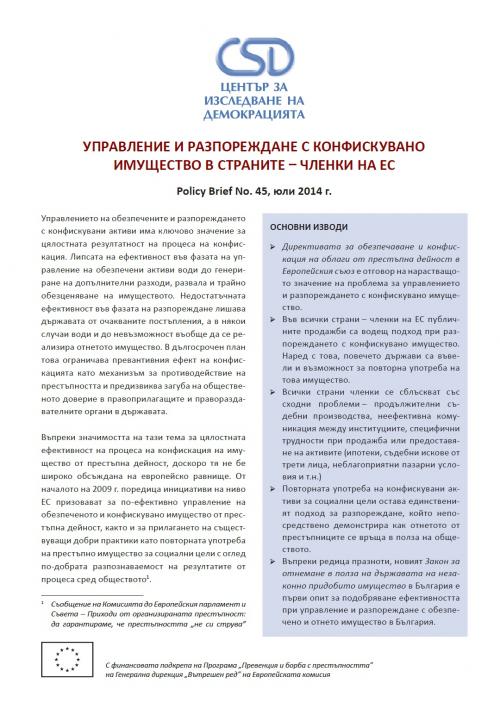
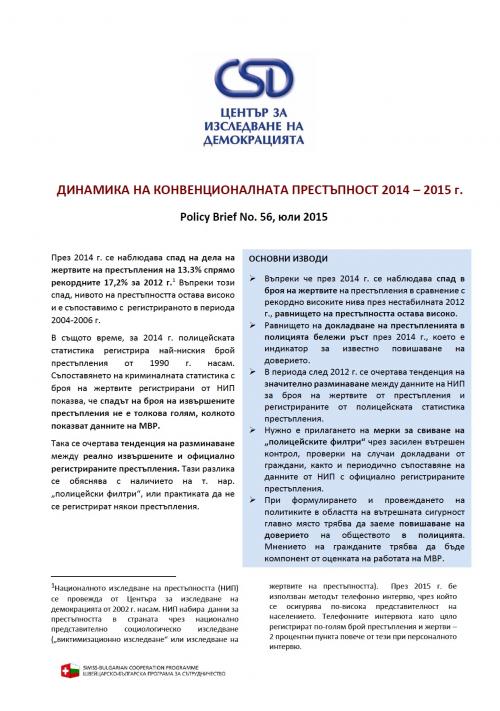
Crime rates in 2014 decreased compared to the record high levels of 2012. Nevertheless, the conventional crime rate remained one of the highest since 2004. Over the past year, more victims reported crimes - a sign of relative increase of confidence in the police. At the same time, there is a continuing discrepancy between data of the victimisation surveys and official police statistics. These are some of the results of the National Crime Survey for 2014, presented in the current situation.
More...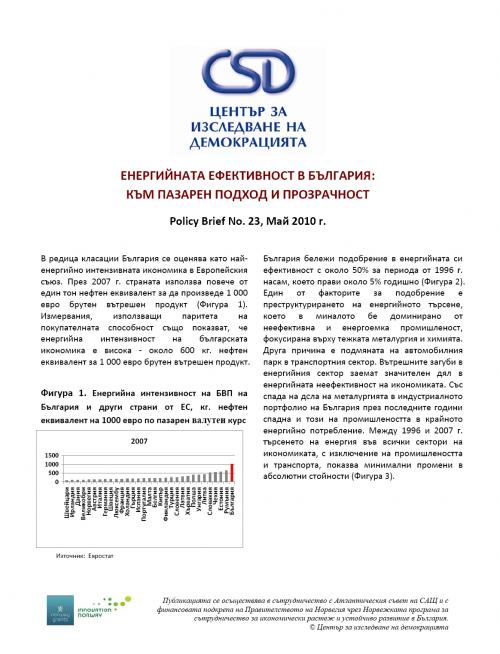
Measured by using market currency exchange rates, Bulgaria has consistently ranked as the most energy intensive economy in the EU: in 2007, it used over a ton of oil equivalent to produce 1,000 Euro worth of gross product. Measured by using purchasing power parity, Bulgaria’s energy intensity is still dismal, around 600 kg of oil equivalent per 1,000 Euro of product. Even though still negligible by any standard, Bulgaria’s energy efficiency has actually improved by about 50% since 1996 and has been on an uninterrupted path to a change for the better by about 5% per year. Overall, the Bulgarian economy seems to have completed the transition from heavy industry to less energy intensive light industry and thus already picked the low hanging fruit of natural gains in efficiency. The country is probably at a point, as some experts argue, from which onwards any additional gain in efficiency will have to be attained through advances in technologies of energy production, conversion, transportation, and use which will call for cost-effective approach and a strong incentive system.
More...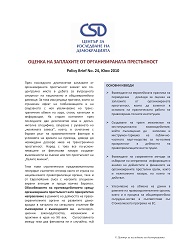
During the past decade organised crime threats have taken on an increasing importance and have become central to the national and EU policy debates on domestic security and citizen safety. The dynamics of globalisation combined with the dismantlement of the Iron Curtain in the heart of Europe led to growing cross-border flows of people, goods, money and information. On the other hand East European transition was marked from its start by a fast rise of criminality, which soon translated into unprecedented levels of transnational organised crime across Europe. Further to that the growing complexity of financial markets created opportunities for white collar criminals, adding some hitherto unknown criminal phenomena.
More...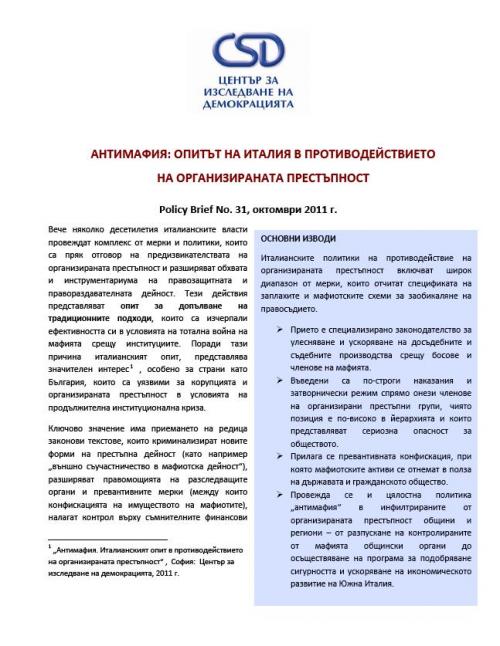
In recent decades the Italian authorities implemented a number of measures and policies as a direct response to the threat of organized crime. These new measures were intended to expand the scope and the number of law enforcement and judicial instruments and were an attempt to complement the conventional approaches, which were no longer effective in light of the persisting mafia influence against public institutions. This is why the Italian experience is specifically valuable for countries like Bulgaria, which are vulnerable to corruption and organized crime.
More...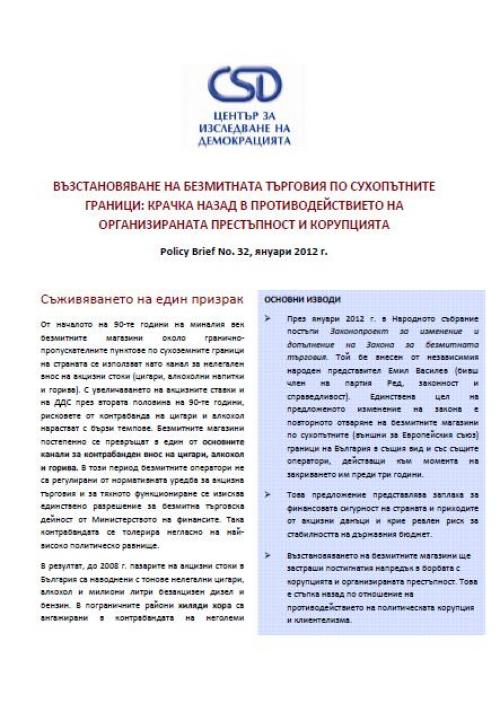
Since the early 1990s the duty-free shops along Bulgaria’s land-border crossings were used as a channel for illegal import of excise goods (cigarettes, alcohol and petrol). With the increase of excise and VAT taxes in the second-half of the 1990s, the risk of alcohol and cigarettes smuggling increased rapidly. The duty-free shops gradually evolved into one of the main channels for the smuggling of cigarettes, alcohol, and fuel. At that period, duty free operators existed without a legal regulation but only with a licensing permit from the Minister of Finance. The smuggling was tacitly tolerated from the highest political level.
More...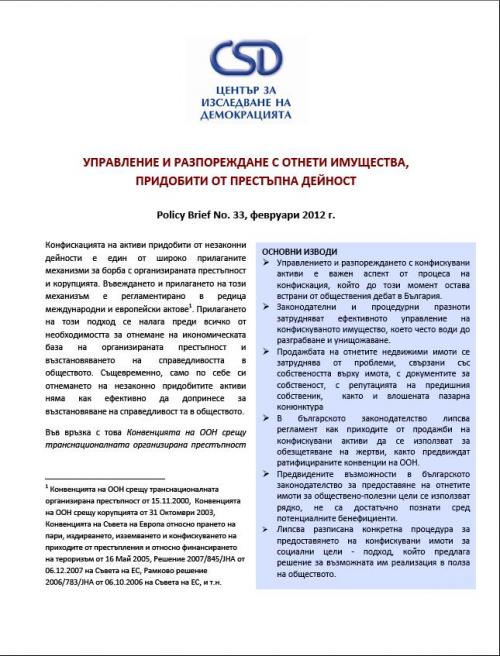
Confiscation of proceeds from illegal activities is a widely applied mechanism in combating organized crime. The introduction and application of this mechanism is defined in several international and European acts, and is motivated by the need to restore social justice. Both the UN Convention against Transnational Organized Crime and the UN Convention against Corruption address the disposal of confiscated assets and recommend its use primarily for compensating the victims of crime. A number of European countries have implemented respective measures and mechanisms like: distribution schemes for compensation of victims of crime, financing of programs for fight against drug use, social re-use of confiscated property.
More...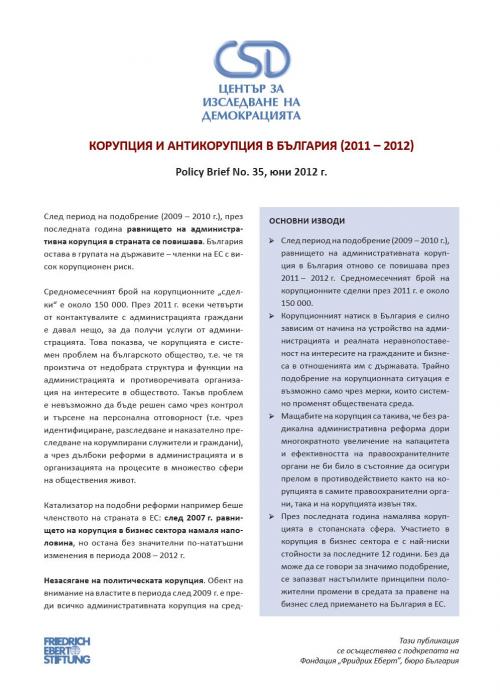
The data on the dynamics of corruption used in the current report are the result of the Corruption Monitoring System (CMS), designed and developed by the Center for the Study of Democracy (CSD) and Vitosha Research. CMS combines significant research and powerful anticorruption advocacy potential. The purpose of CMS is to measure the actual level and trends in the spread of corruption in the country, as well as to identify related public attitudes and expectations. After an improvement in 2010, the level of administrative corruption among the population increased in 2011 – 2012, still placing the country in the group of EU Member States experiencing high levels of corruption. The average monthly number of corruption transactions in 2011 was approximately 150,000. In 2011, a quarter of all citizens who dealt with the state administration had to resort to some kind of irregular payment to receive administrative services. This indicates that corruption is a systemic problem of the Bulgarian society.
More...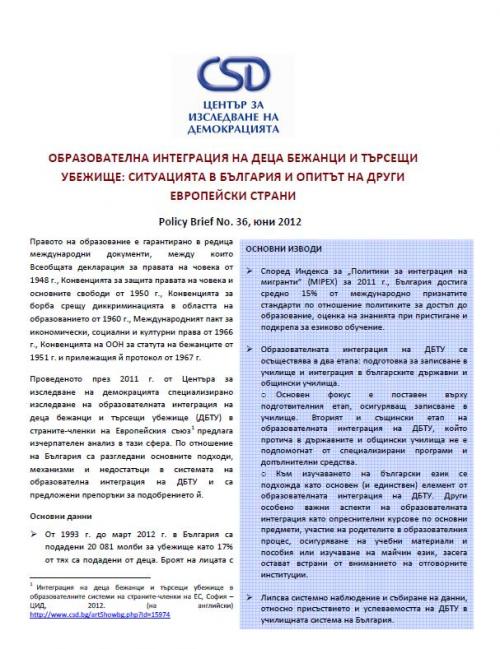
This analysis represents the results of a specialised study of the educational integration of refugee and asylum-seeking children (RASC) in the Member States of the European Union, conducted in 2011 by the Center for the Study of Democracy within the framework on the INTEGRACE project. With regard to Bulgaria, the main approaches, mechanisms and deficiencies in the system for educational integration of RASC were presented and recommendations for its improvement were given.
More...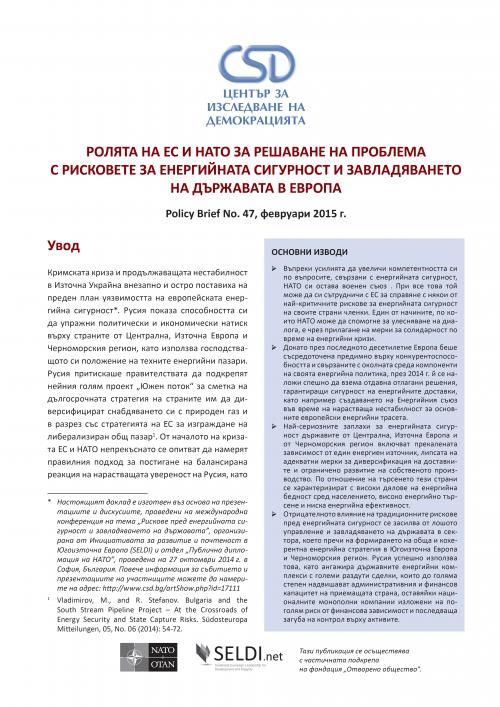
The Crimean crisis and the continuing instability in Eastern Ukraine have turned into a rude wake up call for Europe’s energy security vulnerabilities. Russia has demonstrated its capacity to yield political and economic influence on the countries in the CEE and the Black Sea regions by leveraging its dominant position on their energy markets. Russia has pressured governments to support its flagship project, South Stream, at the expense of the countries’ long-term strategy to diversify their natural gas supply and in defiance of EU’s strategy for building a liberalised common market. Since the beginning of the crisis the EU and NATO have scrambled for finding the right measures to a balanced response to Russia’s growing assertiveness, while striving to alleviate the most acute energy security risks for their members.
More...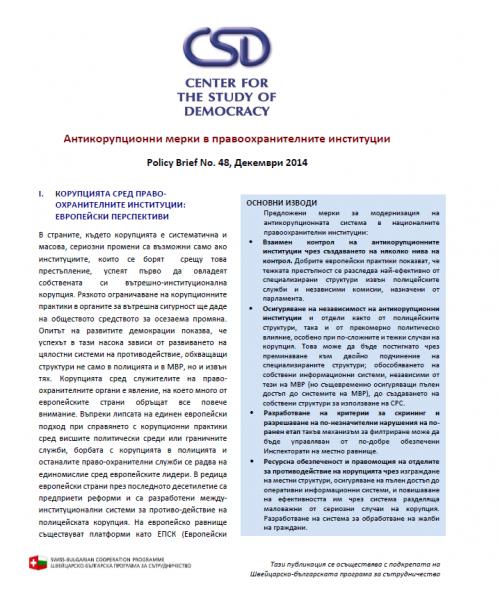
In countries with endemic corruption, integrity reforms can only be successful if anti-corruption institutions succeed in tackling internal corruption challenges. A sharp decline of corruption in law enforcement would provide society with the necessary tools to pursue tangible change. The experience of established democracies is that a successful transformation depends not simply on individual measures but rather on the introduction of sets of effective anti-corruption measures across the entire public administration. Corruption among lawenforcement officers has been viewed with an increasing concern by the authorities and the public in many European states. As a result, while no common approach has ever been tested with respect to the judiciary, elected politicians or the customs, countering police corruption has become an all-European effort. During the last decade, several European countries developed multi-institutional systems for police integrity. On EU level, platforms like the European Partners against Corruption (EPAC) were introduced, enabling specialised anti-corruption institutions to cooperate and share experience. In addition, Europol, Interpol and the UN developed and shared the blueprints of common standards and good practices in preventing police corruption.
More...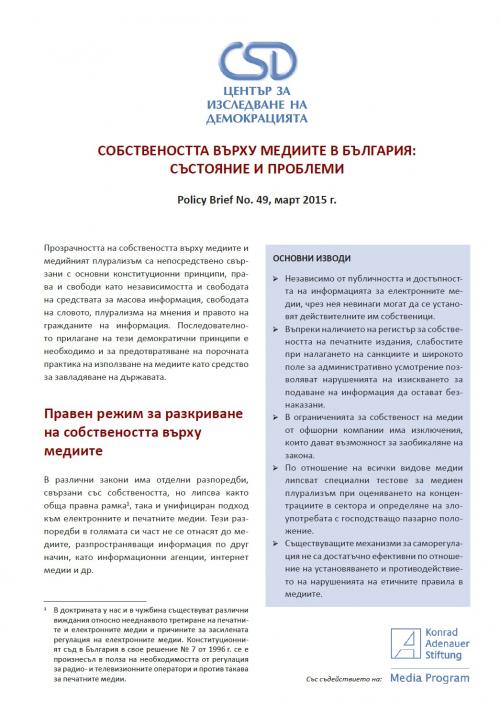
Transparency of media ownership and media pluralism are directly related to fundamental constitutional principles, rights and freedoms such as independence and freedom of the media, freedom of expression, pluralism of opinions and citizens’ right to information. Consistent application of these democratic principles is required to prevent the vicious practice of using the media as an instrument for state capture. The current publication makes a review of the legal framework for disclosing ownership of the media.
More...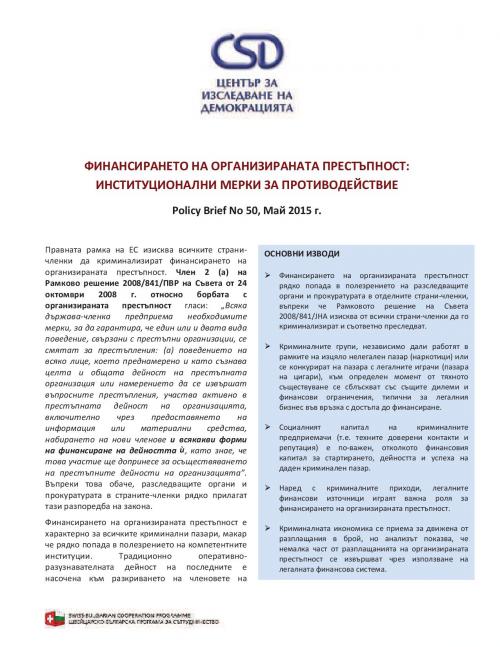
The EU legal framework requires that all Members States criminalise the financing of organised crime. According to the provisions of Article 2 (a) of the Council Framework Decision 2008/841/JHA of 24 October 2008 on the fight against organised crime ‘’Each Member State shall take the necessary measures to ensure that one or both of the following types of conduct related to a criminal organisation are regarded as offences: (a) conduct by any person who, with intent and with knowledge of either the aim and general activity of the criminal organisation or its intention to commit the offences in question, actively takes part in the organisation’s criminal activities, including the provision of information or material means, the recruitment of new members and all forms of financing of its activities, knowing that such participation will contribute to the achievement of the organisation’s criminal activities.” Nevertheless, criminal justice authorities in Members States rarely make use of these provisions.
More...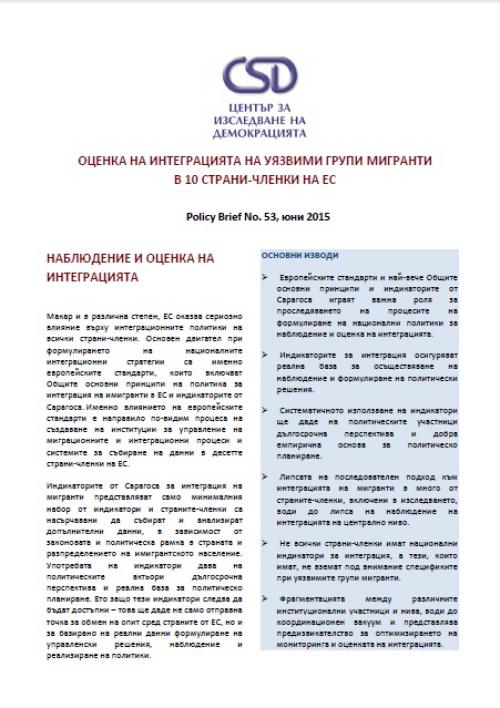
The EU has played an influential role on Member States and their integration policies, albeit to varying degrees. EU standards have been vital in moving Member States towards the formulation of national integration strategies, which have taken into account the Common Basic Principles of Immigrant Integration and the Zaragoza indicators. The process of developing migration and integration management institutions and the correspondent data collection systems has become more apparent under the influence of EU standards and regulations in all ten Member States. The Zaragoza set of indicators in migrant integration are only a minimum list of indicators and States are encouraged to collect and analyse further data according to their specific composition of the migrant population and the legal and policy framework. The use of indicators gives policy actors a lasting perspective and evidence base for policy planning. The availability of these indicators is therefore a starting-point for more shared learning across the EU and evidence based policy making, implementation and monitoring. The setting up of national integration indicators can be seen as a positive development in Austria, Belgium and soon Italy as it helps provide an evidence base for policy monitoring as well as policy making in these countries.
More...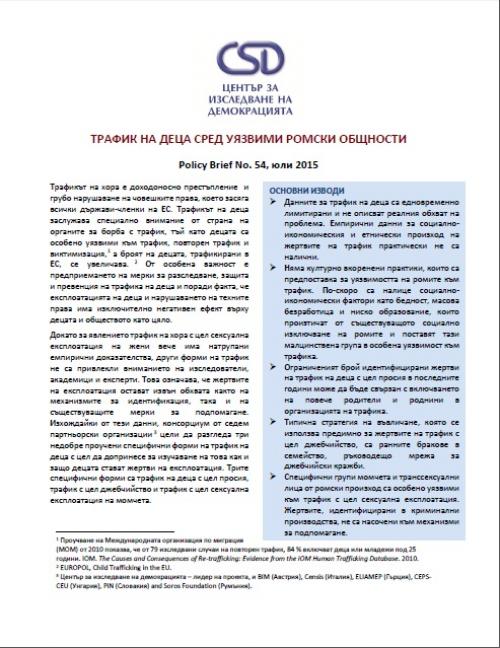
Trafficking in persons is a lucrative crime and a gross human rights violation, which affects all EU Member States. Trafficking in children merits special attention of anti-trafficking efforts as children are especially vulnerable to trafficking, re-trafficking and victimisation and the number of children trafficked throughout the EU is on the rise. Investigation, protection and prevention measures for child trafficking are especially needed as the exploitation of children and violation of their rights have dramatic negative effects on children and society as a whole. While there is some empirical evidence on trafficking in human beings for the purpose of sexual exploitation of women, other forms of trafficking have not drawn attention of researchers, academics and policy makers. This means that victims of exploitation fall outside the radar of identification and thus cannot access the available assistance. Having this in mind, a consortium of seven partner organisations3 sough to explore three specific under-researched forms of child trafficking in order to contribute to the knowledge on how and why children fall prey to exploitation. The three forms studied are child trafficking for the purpose of begging exploitation, child trafficking for the purpose of pick-pocketing and child trafficking for the purpose of sexual exploitation of boys.
More...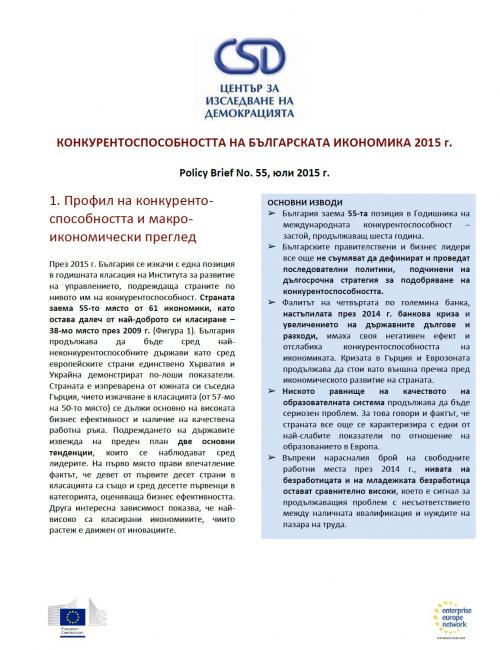
In 2015 Bulgaria has regained one position compared to the previous year in the economic competitiveness ranking of the World Competitiveness Yearbook (WCY), published by the Institute for Management Development (IMD). The country is ranked 55th out of 61 economies. This is only a marginal improvement and remains significantly lower compared to its highest achievement in 2009 – 38th place. The ranking highlights two particular commonalities among the best ranking countries. Firstly, nine countries from the top 10 are also listed in the top 10 of the business efficiency factor. And secondly, all top positions are occupied by economies which are driven by innovation-based growth. In the policy brief the Center for the Study of Democracy provides the following recommendations for increasing the competitiveness of the Bulgarian economy: • Tackle high level corruption and state capture; • Modernize public administration and strengthen independent regulators; • Adopt education for innovation-based growth; • Tackle energy poverty, energy intensity and supply dependency; • Improve the country’s branding.
More...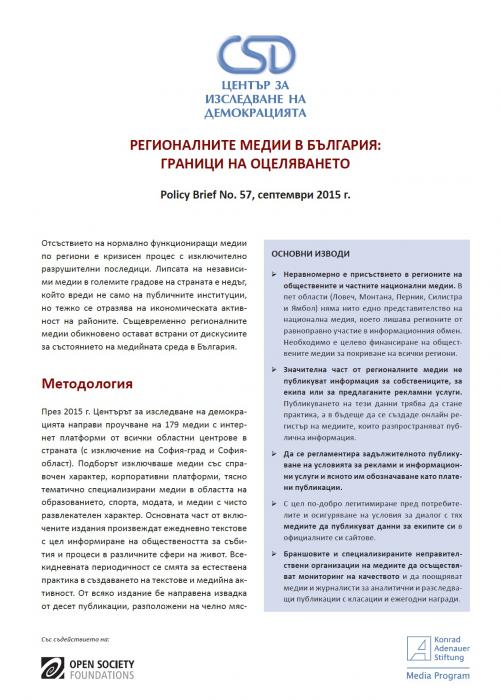
The lack of adequate local media is a trend with devastating implications for the regions of Bulgaria. It affects not only the local public institutions; regional economic activity is also hindered by the absence of independent media. At the same time, when discussing the state of media in Bulgaria, the problems of local media are often overlooked. The current publication presents the results of a survey of 179 local media with internet presence. The analysis focused on the mechanisms and factors that prevent journalists and the media from informing the public in an objective, competent, and comprehensive way.
More...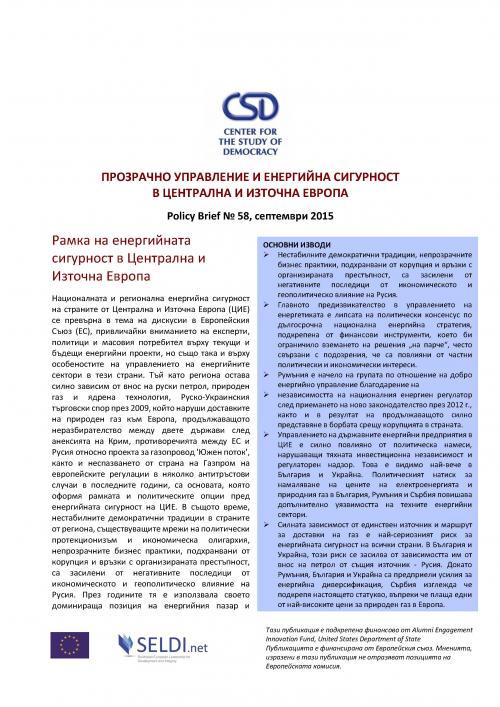
The national and regional energy security of Central and Eastern European (CEE) countries has become a hot topic of discussion in the EU recently, focusing the attention of experts, policy makers, and the general public on ongoing and future energy projects but also on the features of energy governance in these countries. The interruption of gas supplies to Europe as a result of the Russian-Ukrainian pricing dispute in 2009, the continuing Russian-Ukrainian crisis after the annexation of Crimea, and the EU-Russia controversies regarding the South Stream pipeline project, as well as Gazprom’s non-compliance with the EU regulations in several anti-trust cases in the past few years are the major cornerstones that shape the CEE energy security framework and policy options as the region remains heavily dependent on Russian oil, gas, and nuclear technology. At the same time, the fragile democratic traditions in the CEE countries, the existing networks of political protectionism and economic oligarchy, and the opaque business practices nurtured by corruption and links with organized crime, have been reinforced by the negative implications of Russian economic and geo-political influence. Russia has exploited its dominant position in the energy market and its long-term links with certain political and economic groups to shape political decisions across the region according to its own interests, but often to the detriment of the home country consumers. The current review of energy security risks in four selected CEE countries, two energy poor – Bulgaria and Serbia, and two energy-resourced– Romania and Ukraine, assesses the factual situation per se and the transparency and accountability of energy policy governance in the region.
More...